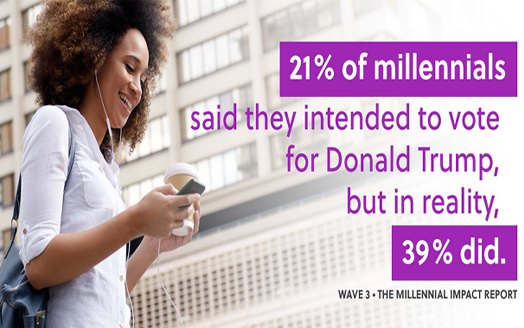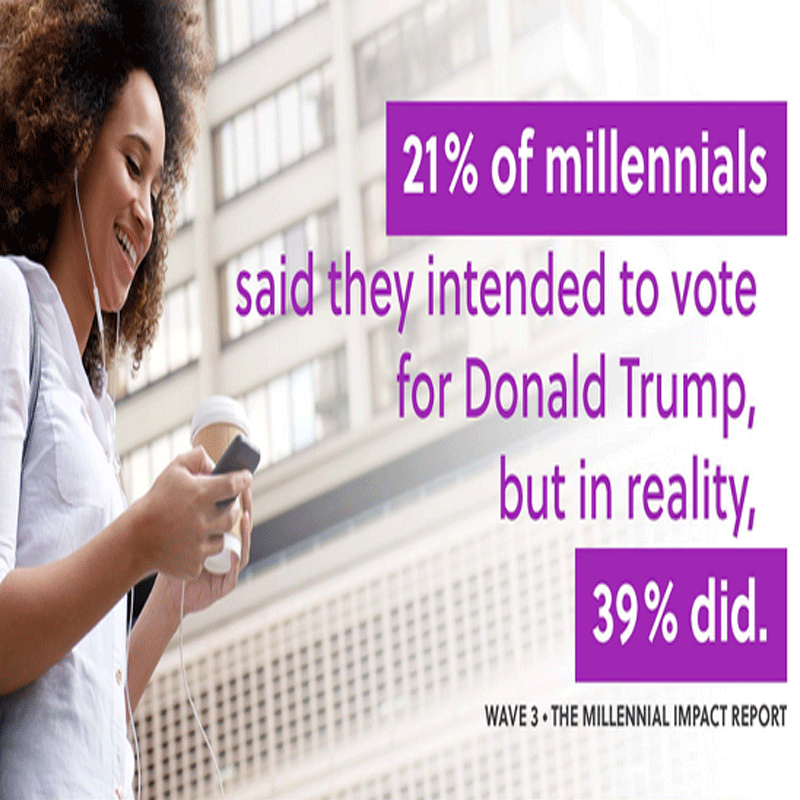
by Lil Tuttle
President-elect Donald Trump owes much of his electoral success to the promise to reverse progressive federal policies that have stalled the U.S. economy for the past eight years. Millennial voters’ primary concern on election day was employment and jobs, according to a post-election Millennial Impact Report study, and “most millennials who gave their rationale for voting for Trump said he had the highest possibility of improving the economy since he was a businessman.” On Election Day, 39% cast their vote for Trump, while only 21% said they planned to vote for him prior to the election.
A new Federal Reserve report last week show how badly millennials have been hurt by the stagnant economy:
- Millennials earn 20% less than Baby Boomers did at the same stage of life, despite being better educated. The median college-educated millennial earns only slightly more than a Baby Boomer without a degree in 1989.
- Millennials’ median net worth is $10,090—56% less than it was for Boomers.
- Millennials’ median income has also fallen compared to their Boomer counterparts: white millennials’ median income is down 21% to $47,688, and black millennials’ down 1.4% to $27,892. Only Latino millennials saw a median income increase: 29% up to $30,436.
Repeal, Cut and Gut Bad Policies
To jump start the economy, the incoming Trump administration, House, and Senate have set a fast-paced, ambitious agenda for their first 200 days in office in three major policy areas.
- Repeal and replace the Affordable Care Act (i.e., Obamacare), which many consider to be one of the biggest obstacles to job creation and economic growth;
- Cut punishing federal tax rates to keep—and bring back—businesses and industries to the U.S.; and
- Gut onerous progressive federal regulations that choke innovation, bind economic activity in a straightjacket of red tape, and kill jobs.
The Trump administration’s focus fits well with agenda, called A Better Way, already put forward by the GOP House of Representatives and Speaker Paul Ryan.
U.S. Back in Business
Trump’s economic policies, reports CNBC, “have the potential to trigger a new age in U.S. economic growth‚” according to Deutsche Bank forecasts. Deutsche Bank Chief Economist David Folkerts-Landau said the new agenda will serve as a “game changer,” pushing U.S. GDP growth up to 3.6 percent in 2018 and raising global GDP as well.
This policy will be successful in moving the U.S. economy away from low-growth secular stagnation towards significantly more buoyant performance. We would not be taken by surprise by a doubling of the growth rate of real GDP in the U.S. over the next two years, nor by a further significant move up of equity valuations and a material further appreciation of the dollar.
Businesses have responded in anticipation of Trump’s improved business economic climate:
- General Motors Co announced plans to invest at least $1 billion across several U.S. factories producing more than 1,000 new jobs.
- Wal-Mart Stores announced it plans to create about 10,000 U.S. jobs this year.
- Ford Motors cancelled plans for a $1.6 billion Mexico plant and will create 700 U.S. jobs instead.
- Sprint Corp and a U.S. satellite company OneWeb will bring 8,000 jobs to the U.S., part of a previously disclosed pledge by Japan’s SoftBank Group Corp.
- Amazon announced it plans to create 100,000 new full-time jobs in the U.S. over the next 18 months.
- IBM announced it plans to hire 25,000 people in the U.S. and invest $1 billion over the next four years.
- Foxconn, the world’s largest contract electronics manufacturer and a major Apple Inc supplier, said it was in preliminary discussions to expand its operations in the U.S.
- The oil industry is starting to hire back workers and add shale rigs in North America that had been lost during the last 3 years.
In a December 7th interview, United States Steel CEO Mario Longhi told CNBC his company would like to “bring back the [close to 10,000] employees we’ve been forced to lay off during that depressive period.”
We already structured to do some things, but when you see in the near future improvement to the tax laws, improvements to regulation, those two things by themselves may be a significant driver to what we’re going to do.
The economic outlook is suddenly looking a whole lot brighter for millennials, even before the new administration takes office on January 20.

